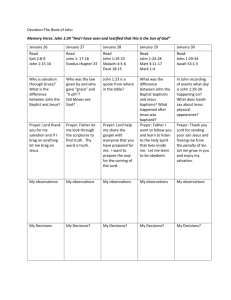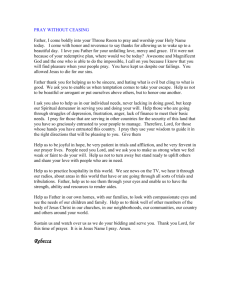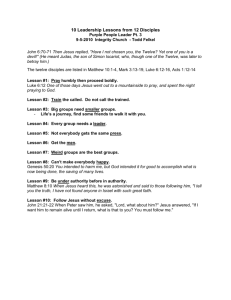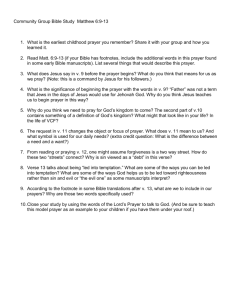17 Sunday in Ordinary Time July 25, 2010 10 am
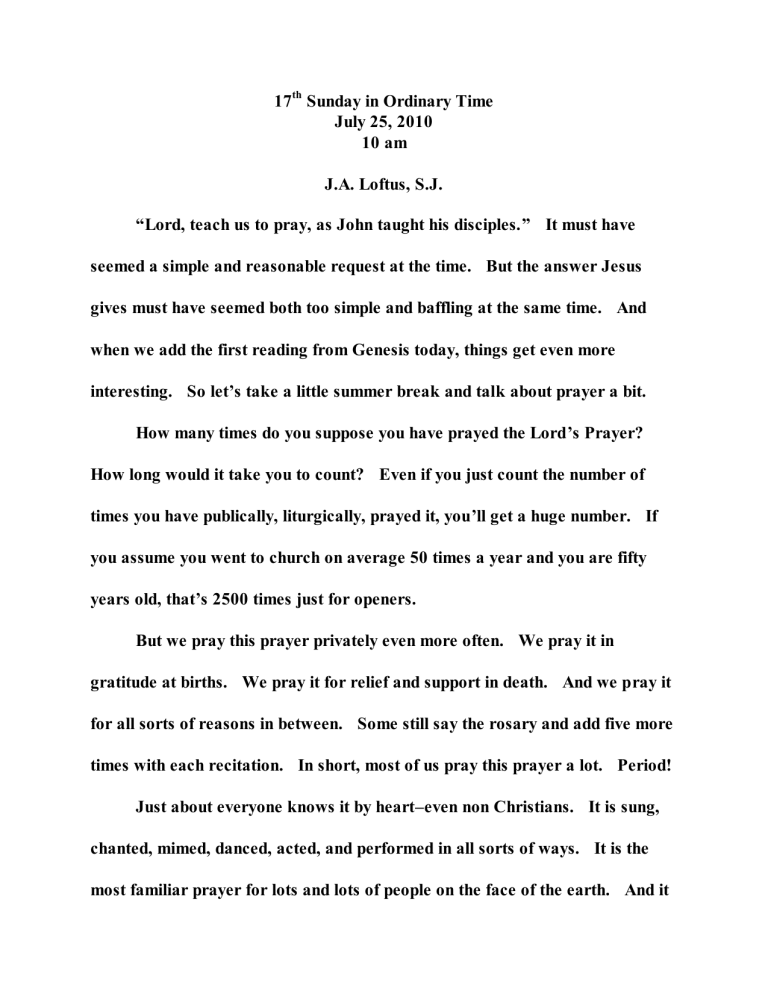
17 th
Sunday in Ordinary Time
July 25, 2010
10 am
J.A. Loftus, S.J.
“Lord, teach us to pray, as John taught his disciples.” It must have seemed a simple and reasonable request at the time. But the answer Jesus gives must have seemed both too simple and baffling at the same time. And when we add the first reading from Genesis today, things get even more interesting. So let’s take a little summer break and talk about prayer a bit.
How many times do you suppose you have prayed the Lord’s Prayer?
How long would it take you to count? Even if you just count the number of times you have publically, liturgically, prayed it, you’ll get a huge number. If you assume you went to church on average 50 times a year and you are fifty years old, that’s 2500 times just for openers.
But we pray this prayer privately even more often. We pray it in gratitude at births. We pray it for relief and support in death. And we pray it for all sorts of reasons in between. Some still say the rosary and add five more times with each recitation. In short, most of us pray this prayer a lot. Period!
Just about everyone knows it by heart–even non Christians. It is sung, chanted, mimed, danced, acted, and performed in all sorts of ways. It is the most familiar prayer for lots and lots of people on the face of the earth. And it
has been for centuries.
But it’s very familiarity can breed some difficulties. As St. Augustine is reputed to have said many centuries ago: “It is a common proverb that too much familiarity breeds contempt.” (The Latin text sounds even better:
“Vulgare proverbium est, quod nemia familiaritas parit contemptum.” [ Scola
Paradisi 8]) Contempt might be a bit strong. But too much familiarity can bring on shallowness, rote recitation, and occasional numbness.
Unlike Matthew’s version of the Lord’s Prayer, the one we are most familiar with and use in liturgical contexts, Luke’s version today offers some interesting context and some variety.
Notice first that in Luke’s version Jesus is praying by himself. He is not in a prescribed place (like the temple or a synagogue). He is not praying at a prescribed time (like sunset or daybreak). He is, Luke tells us, just “in a certain place.” This is not “official” praying, but regular praying for regular people. As theologian John Shea comments, “Jesus lives in a rhythm of prayer and action, swimming in both the waters of God and the waters of the world.
He knows when he must turn toward God and when he must turn to the incessant demands of the world. Now was the time to turn toward God. ”
Notice too that the disciples do not ask Jesus for a dissertation on prayer.
2
No, they want to learn how to pray like Jesus prays. They have watched Jesus pray before and they surmise while observing him closely that how Jesus connects with God may account for his unpredictable attitudes and behaviors.
If they could connect with God they way Jesus does, “their difficulties in following him might be significantly lessened.” (Shea, 207)
So they listen carefully. They notice first that Jesus’ prayer lacks solemnity. It seems so familiar. In fact, it sounds just like a great and very familiar Jewish prayer called the Kaddish. “Exalted and hallowed be his great name....may he establish his kingdom in your lifetime and in your days.” But they also notice a very familiar thing peculiar to Jesus. The prayer is addressed to Abba , the diminutive and quite familiar nickname for one’s father.
The disciples also notice that Jesus’ way of prayer does not begin with human need. It begins, rather, uniting itself with God in God’s most mysterious and hallowed presence. “Hallowed be thy name, thy kingdom come....” This is God’s action and God’s being. The hallowing becomes the bread each day Jesus needs for life. But it is the action of God’s Spirit that
Jesus simply recognizes and celebrates. It is not just a petition for needs unmet.
3
But even when the words are said and done, Jesus is not finished. He then tells the disciples about the attitude one should have at prayer: An attitude of persistence and expectation. And Jesus tells the humorous parable of the brash and tenacious attitude required. If friendship alone is not enough to wake the dead, then cause a divine ruckus. Pound on the door–not to change God, but to change yourself, to allow yourself to become more open to receiving the Spirit of God already pouring herself out at every moment of your life. No one is going to give you a snake or scorpion when you ask for a fish.
Abraham models the same tenaciousness in the first reading. Just keep bothering God; it always works. “How about only 10 just men?” I think of the candid prayers of Tevye in Fiddler on the Roof . Really now: “Would it ruin some vast, eternal plan if I were a wealthy man?”
The prayer of Jesus is the prayer of reception. A prayer for openness, for softening, for growth. Learning how to open myself daily to see and taste and smell the Spirit of God already blowing through the trees. The trees of my external landscape, but perhaps more importantly, blowing through the trees of my internal landscape. I rarely know how or even if my prayer is answered.
But, then again, I don’t even know how the breeze blows or why?
4
So, no matter how much we know it by rote, remember the Lord’s Prayer is the Lord’s Prayer . It invites us into a consciousness that is not normally our own. It is the consciousness, the eyes and ears of Godhead itself.
So, by all means, summon the courage to join the disciples and ask Jesus:
“Lord, teach me to pray, as John taught his disciples.” But be careful. You may get much more than you bargained for every time you say it.
5

